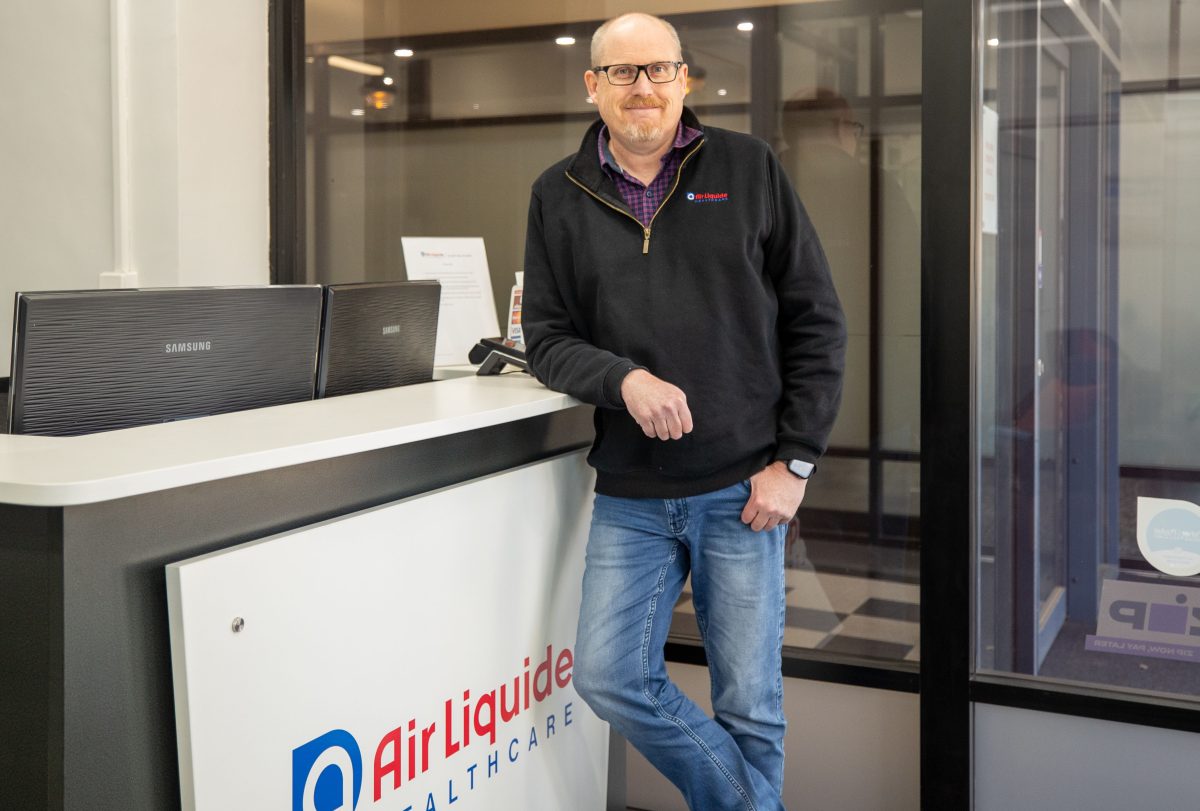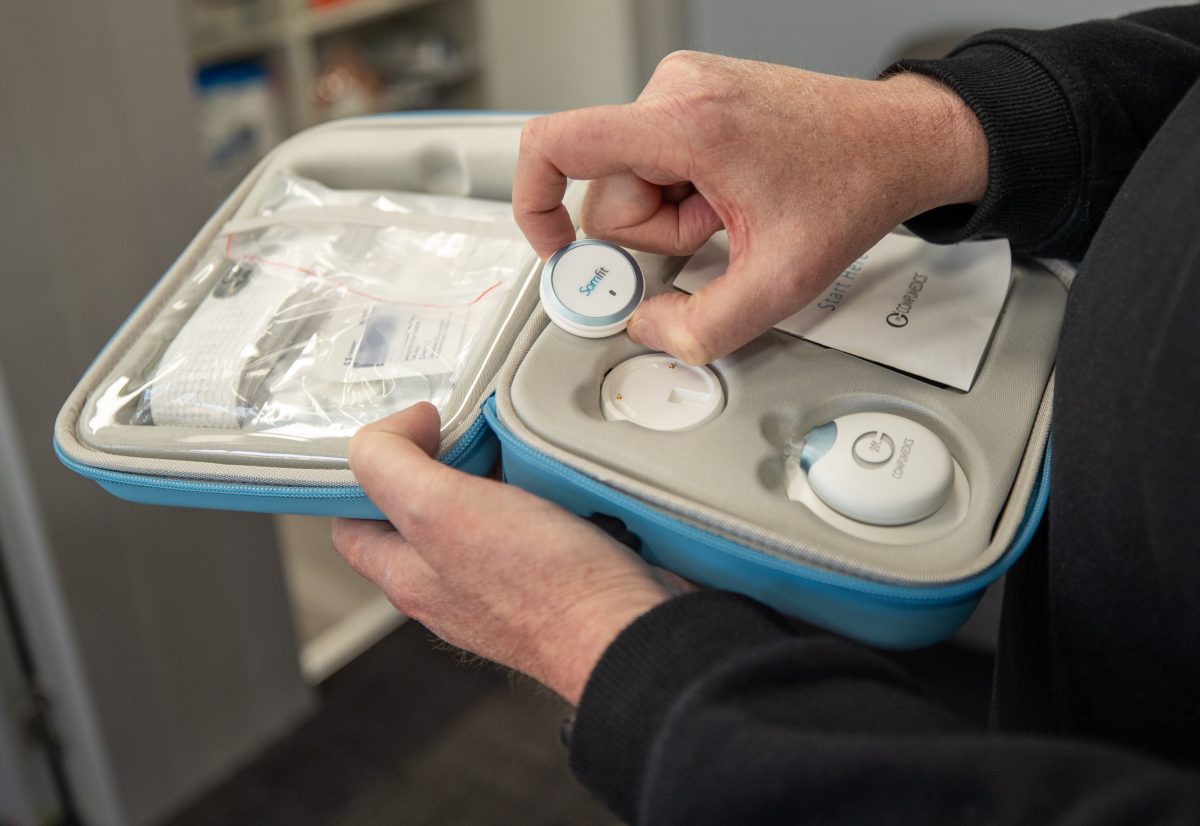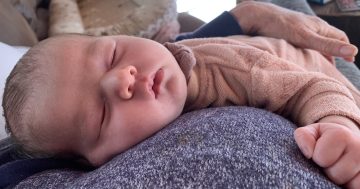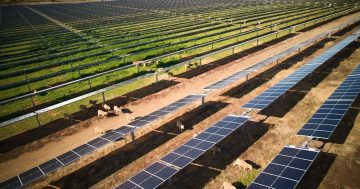
Sleep technician Tim Cubis is pleased people in the Riverina now have access to the new Somfit Pro sleep study solution. Photo: Adam Drummond.
If you have sleep apnoea and it’s not being treated, your risk of heart attack or stroke increases by at least 70 per cent. The disorder can also increase your risk of developing Alzheimer’s disease and dementia.
Air Liquide Healthcare Sleep Solutions Riverina owner and sleep technician Tim Cubis said many people were probably living with an undiagnosed sleep disorder.
“People might not realise how serious sleep disorders can be, and the impact they can have on their general health and mental wellbeing,” he said.
“They may have noticed symptoms, but have been putting off having a sleep study done because trying to sleep with cords and electrodes attached to your body can be a complete nightmare.”
However, Tim said Riverina patients now had access to new technology that could provide a clear picture of their sleep quality while they slumbered in comfort.
“The new Somfit Pro device has just dropped in Wagga, meaning people requiring a sleep study can get an accurate sleep reading without getting tangled up in all those annoying cables,” he said.
“Not only are the old wire and electrode systems uncomfortable, they can actually interrupt your sleep, providing an inaccurate result.”
The Somfit Pro system consists of a small round device and two sensors that attach to a strap around the chest, and a disposable adhesive electrode that sticks to your forehead – that’s it.
The device connects to the Somfit app on your smartphone and sleep study results are uploaded directly to Sleep Solutions’ independent sleep physicians, who provide a report to your doctor.
Tim said the system was a game-changer for people with sleep apnoea, insomnia and other sleep disorders.
“Doing a sleep study with all that stuff hooked up to you is not ideal,” he said.
“People are conscious of all the wires and dozens of electrodes stuck on them. The old systems are intrusive, so they don’t give a true recording of someone’s sleep.
“With the Somfit Pro, they can sleep a hell of a lot easier.”

The Somfit Pro comes in a kit and is easy to set up at home. Photo: Adam Drummond.
Tim said the device was easy for people to set up and put on at home, with step-by-step videos on the Somfit website.
“Once it’s on, you just hit the start button and off it goes. It’s all connected via Bluetooth and the results are uploaded in real time,” he added.
“You only need to wear it for one night.”
Tim said the old-style systems were complicated, meaning they had a higher risk of failure.
“They had so many variables, and things regularly went wrong when people hooked themselves up,” he said.
“The Somfit Pro device is pretty hard to stuff up. It’s simple, easy to do and gives us a more accurate reading of what’s going on.”
The equipment records your brain activity, cardiac activity, breathing, breathing effort, oxygen saturation, and body position. This information paints a clear picture of your sleep quality.
Two-thirds of Australians sleep a comfortable seven to nine hours, while one in 10 sleeps only five hours a night.
Many people do not know they have a sleep disorder, but may have symptoms such as fatigue, headaches, poor concentration, poor memory and irritability during the day.
“Some of the night-time warning signs that someone might have sleep apnoea are snoring, and they might stop breathing, then take a big gasp of air in, waking themselves – and their partner – up,” Tim said.
Untreated, obstructive sleep apnoea is associated with a higher risk of cardiovascular disease, while central sleep apnoea is most commonly seen in patients with heart failure.
Bruxism, or teeth grinding, can lead to headaches, jaw pain and daytime tiredness, and chronic insomnia can be detrimental to physical and emotional health.
Parasomnia, which covers a variety of unusual events that can occur during sleep, including abnormal movements, behaviours, nightmares, sleepwalking and sleep talking, can pose a risk to your health and safety.
Sleep interruptions interfere with deep, restorative sleep, which can weaken emotional resilience and potentially increase the risk of depression.
Tim said the Somfit Pro sleep technology could help identify a range of sleep disorders that could potentially lead to, or be a symptom of, serious health conditions, with more and more people being studied every year.
The global market for sleep technology was $16 billion in 2022 and, with the increase in sleep-related conditions, it is expected to increase to $107b by 2033.
Anyone who thinks they may have a sleep disorder, or is living with unexplained diabetes or high blood pressure, should request a sleep study referral from their doctor or health professional.
To learn more about sleep disorders, sleep studies, treatment and the Somfit Pro, visit Air Liquide Healthcare Sleep Solutions Australia.









